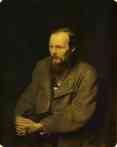Feodor Dostoevsky
 Dostoevsky,
Feodor Mikhailovich (1821-81), Russian prose writer. He was born in
Moscow, the second son of a physician’s seven children. His mother died
in 1837 and his father was murdered by his serfs a little over two years
later. After leaving a private boarding school in Moscow he studied from
1838 to 1843 at the St. Petersburg Engineering Academy. His first published
work, a translation of Balzac’s Eugénie Grandet, appeared
in 1844, followed by his first original work, the short story
Poor Folk
(1846), The Double (1846), White Nights (1848), and other
short prose pieces. In April 1849 Dostoevsky was arrested as a member of
the Socialist Petrashevsky circle.
After a macabre mock execution, he was sent to a Siberian penal servitude
for four years, to be followed by four years as a soldier. During his imprisonment
he underwent a religious crisis, rejecting Socialism and progressive ideas
of his early years, and replacing them by a belief in the Russian Orthodox
Church. His next publication, The Village of Stepanchikovo, appeared
only in 1859. Then came Notes from the House of the Dead (1860-1),
based on his period of imprisonment, which, along with the novel
The
Insulted and the Injured (1861), appeared in the journal Vremya
(Time), which he founded with his brother Mikhail. In 1862 he traveled
abroad, visiting England, France, Germany, and Italy. His views on Western
Europe are recorded in Winter Notes on Summer Impressions (1863).
In London, which he describes as ‘Baal’, center of world capitalism, he
saw the Crystal Palace of the World Exhibition, an image he was to use
to express the corruption of the modern scientific world in Notes from
Underground and other works. Another impression reflected in his later
work was his horror at the poverty of Whitechapel and the prostitutes of
the Haymarket. In London he also visited Herzen and Bakunin. In 1863, his
magazine Vremya (Time) was forbidden. Dostoevsky made further trips
abroad throughout the 1860s. The series of brilliant works which followed,
Notes
from Underground (1864), Crime and Punishment (1866),
The
Idiot (1868), The Devils (1872), An Adolescent (A
Raw Youth, 1875), and
The Brothers Karamazov (1880), are those
on which his reputation is based. In them Dostoevsky reveals extraordinary
powers of character analysis, considers profound religious and political
ideas, showing himself to be a significant and powerful thinker, and develops
the Russian novel, both through the use of urban settings and by his gift
for narrative tension. Among English writers Dostoevsky admired Shakespeare,
Sir Walter Scott, Byron, and in particular Dickens, who had been known
and translated in Russia since around 1838, they share an interest in such
major subjects as the city, children, and the suffering of the innocent.
Many of his works are translated into English.
Dostoevsky,
Feodor Mikhailovich (1821-81), Russian prose writer. He was born in
Moscow, the second son of a physician’s seven children. His mother died
in 1837 and his father was murdered by his serfs a little over two years
later. After leaving a private boarding school in Moscow he studied from
1838 to 1843 at the St. Petersburg Engineering Academy. His first published
work, a translation of Balzac’s Eugénie Grandet, appeared
in 1844, followed by his first original work, the short story
Poor Folk
(1846), The Double (1846), White Nights (1848), and other
short prose pieces. In April 1849 Dostoevsky was arrested as a member of
the Socialist Petrashevsky circle.
After a macabre mock execution, he was sent to a Siberian penal servitude
for four years, to be followed by four years as a soldier. During his imprisonment
he underwent a religious crisis, rejecting Socialism and progressive ideas
of his early years, and replacing them by a belief in the Russian Orthodox
Church. His next publication, The Village of Stepanchikovo, appeared
only in 1859. Then came Notes from the House of the Dead (1860-1),
based on his period of imprisonment, which, along with the novel
The
Insulted and the Injured (1861), appeared in the journal Vremya
(Time), which he founded with his brother Mikhail. In 1862 he traveled
abroad, visiting England, France, Germany, and Italy. His views on Western
Europe are recorded in Winter Notes on Summer Impressions (1863).
In London, which he describes as ‘Baal’, center of world capitalism, he
saw the Crystal Palace of the World Exhibition, an image he was to use
to express the corruption of the modern scientific world in Notes from
Underground and other works. Another impression reflected in his later
work was his horror at the poverty of Whitechapel and the prostitutes of
the Haymarket. In London he also visited Herzen and Bakunin. In 1863, his
magazine Vremya (Time) was forbidden. Dostoevsky made further trips
abroad throughout the 1860s. The series of brilliant works which followed,
Notes
from Underground (1864), Crime and Punishment (1866),
The
Idiot (1868), The Devils (1872), An Adolescent (A
Raw Youth, 1875), and
The Brothers Karamazov (1880), are those
on which his reputation is based. In them Dostoevsky reveals extraordinary
powers of character analysis, considers profound religious and political
ideas, showing himself to be a significant and powerful thinker, and develops
the Russian novel, both through the use of urban settings and by his gift
for narrative tension. Among English writers Dostoevsky admired Shakespeare,
Sir Walter Scott, Byron, and in particular Dickens, who had been known
and translated in Russia since around 1838, they share an interest in such
major subjects as the city, children, and the suffering of the innocent.
Many of his works are translated into English.
See: Vasily Perov. Portrait
of the Author Feodor Dostoyevsky.